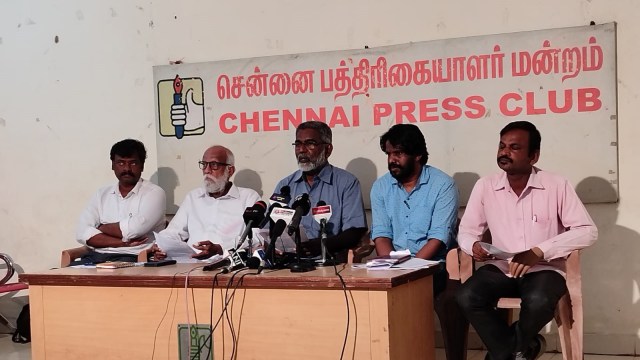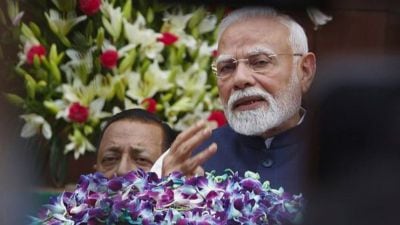Stay updated with the latest - Click here to follow us on Instagram
SIPCOT project: Farmers’ associations, civic groups urge TN govt to drop charges against arrested activist
Protests have been underway by farmers of Melma and other villages in Tamil Nadu’s Tiruvannamalai against land acquisition for the proposed Phase-III works of the SIPCOT project.
 On Friday, representatives of farmers’ organisations and civic groups including Samyukta Kisan Morcha (SKM), Pachai Tamizhagam Katchi, Poovulagin Nanbargal, and Makkal Iyakkangalin Desiya Kootamaipu addressed a press briefing where they placed their demands to the state government over the ongoing issue.
On Friday, representatives of farmers’ organisations and civic groups including Samyukta Kisan Morcha (SKM), Pachai Tamizhagam Katchi, Poovulagin Nanbargal, and Makkal Iyakkangalin Desiya Kootamaipu addressed a press briefing where they placed their demands to the state government over the ongoing issue. Farmers’ associations and civic groups in Chennai have urged the Tamil Nadu Government to revoke the charges under the Goondas Act against Arul Arumugam, one of the 20 farmers who were arrested for protesting against land acquisition for Phase III of the SIPCOT project near Cheyyar in Tiruvannamalai.
While the other 19 farmers were released by the government last week, Arul Arumugam of Uzhavar Urimai Iyakkam (Farmers’ Rights Union), who has 19 cases against him, remains at the Palayamkottai prison in Tirunelveli.
The farmers of Melma and eight other neighbouring villages in Tiruvannamalai were protesting for over 120 days against the acquisition of 3,174 acres for the proposed Phase-III of the State Industries Promotion Corporation of Tamil Nadu (SIPCOT) project.
On November 4, the police arrested 20 protesters based on an FIR filed in August. The Tiruvannamalai district administration invoked the Goondas Act against seven farmers, drawing flak from Opposition parties as well as activists who alleged that the government was trying to suppress the fundamental rights of the farmers. Following this, Chief Minister M K Stalin ordered the cancellation of the charges under the Goondas Act against six farmers, except Arul.
On Friday, representatives of farmers’ organisations and civic groups including Samyukta Kisan Morcha (SKM), Pachai Tamizhagam Katchi, Poovulagin Nanbargal, and Makkal Iyakkangalin Desiya Kootamaipu addressed a press briefing where they placed their demands to the state government over the ongoing issue.
Calling the projects anti-people, the associations urged the government to drop the SIPCOT Phase III works as well as the construction of the greenfield airport at Parandur in Kancheepuram district.
The organisations, in a statement released on Friday, claimed that the government had withdrawn the charges under the Goondas Act against six people after threatening their families and getting them to agree that they will not participate in any more protests, and based on the recommendation of a minister.
“This act of the government is against democracy, it is dictatorial. Threatening the people, receiving a written statement from them and later presenting it as if they have been forgiven through generosity can never happen even in a banana republic. Arul, who is not an anti-social element nor had committed any robbery, has been left to suffer in Palayamkottai prison for the past 15 days as he did not succumb to the government’s threat,” said S P Udhayakumaran of Pachai Tamizhagam Katchi (Green Tamil Nadu Party).
“He has been lodged so far away by the government with the intention that none of his family members, friends should be able to meet him. We urge the government to withdraw the Goondas Act charges against him and release him immediately,” Udhayakumaran added.
He further claimed that withdrawing cases registered against the people of Kudankulam was one of the election promises of Chief Minister Stalin ahead of the 2021 polls, but 63 of the cases are still pending, preventing youngsters of the region from getting a passport or from applying for any job. Udhayakumaran noted that they will take the matter forward by creating awareness among national leaders and civil activists and engaging their support over the issue.
SKM Tamil Nadu coordinator K Balakrishnan said that before going ahead with the proposed project, the state government should have prepared a social impact assessment report as per the Land Acquisition Act as well as an environment impact report, besides conducting a transparent public consultation.
“To show on record that a consultation meeting was held, the ruling DMK made party supporters participate in it. Seeing such antics, the local farmers – who would potentially lose their land due to the project – walked out of the meeting,” Balakrishnan alleged. He asked what was needed for the government to go ahead with Phase III of the SIPCOT project when phases I and II are yet to be fully utilised.
Advocate Vetri Selvan of Poovulagin Nanbargal (Friends of the Earth) said the state government’s industrial policy is that they would aim to create a land bank of 45,000 acres and try to acquire as many agricultural lands as possible to establish industrial parks and clusters, and it will not be restricted to just Parandur or Cheyyar.
“We are not opposing Industrialisation, but we question the rationality behind it. It looks like the government just wants to show the investors that there is land available for them to invest. In Tamil Nadu’s 20 districts, there are about 26 industrial parks and 12 special economic zones (SEZ). All these are located in the same 20 districts (out of the total 38). However, in agriculturally backward districts such as Dharmapuri, Krishnagiri, Ramanathapuram, etc, there are no such parks. Without focusing on these areas, the government seems to acquire fertile lands which leads to protests by the farmers as it will affect their livelihood,” Selvan explained.
He added that the farmers in Parandur or Cheyyar are independent, self-sufficient in farming and have a certain respect in society, and by acquiring their land, the government degrades them. “A farm land owner becomes a daily-wage labourer post the acquisition. This is not social development or progress. That is why I urge the government to carry out a social impact assessment,” Selvan said.
Earlier, the state government had said that the project provides employment opportunities, as was the case during the earlier two projects in the district, and claimed that only seven acres out of the total region was wetland. The government had said that out of the 1,881 land owners, only 239 raised objections to the acquisition of land, that too because they were allegedly instigated by some vested interests.












